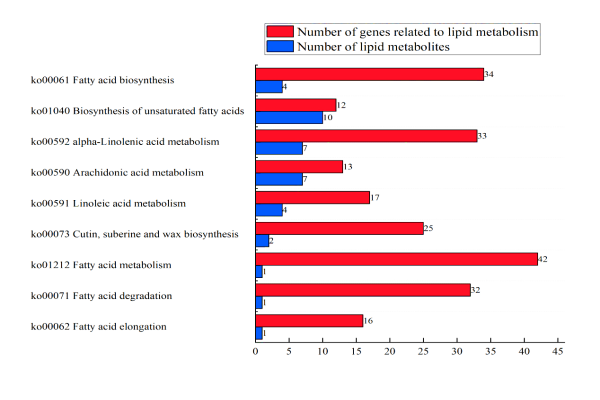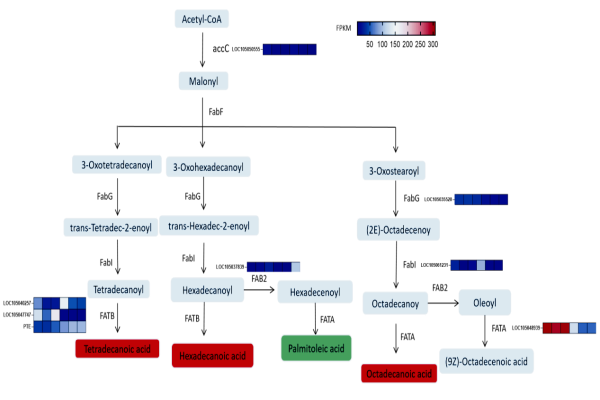Recently, the oil palm resource evaluation research team of the Coconut Research Institute of the Chinese Academy of Tropical Agricultural Sciences has made new progress in the molecular mechanism of oil palm lipid metabolism.The research team conducted joint transcriptome and metabolome analyses of changes in mesocarp lipids at different developmental stages of seedless and thin-shelled oil palms to identify key regulators and pathways involved in lipid biosynthesis in oil palms, and screened for candidate genes that might regulate lipid biosynthesis by correlating gene expression with changes in fatty acid and lipid levels.The research results provide theoretical support for breeding new high-yielding and high-quality oil palm varieties through genetic improvement.
The oil palm, known as the "world's king of oils", is widely used in edible oils, food processing, daily chemical products and bioenergy, and also has a high economic value. Studies have shown that yield and quality traits of palm oil are closely related to lipid synthesis and metabolism, however, there are fewer studies on the regulatory network of oil palm lipid synthesis and its molecular mechanism, which to a certain extent limits the breeding process of new high-yield and high-quality oil palm varieties.Therefore, in-depth analysis of the regulatory mechanisms of oil palm lipid metabolism is of significance to improve the economic benefits of palm oil industry.
In this study, based on oil palm lipidomics data, 30 free fatty acids significantly enriched in its nine lipid metabolism pathways were identified by KEGG enrichment analysis, and it was found that the pathways of fatty acid metabolism (ko01212) and fatty acid biosynthesis (ko00061) play key roles in the synthesis and regulation of lipids (Figure 1).Key genes related to lipid metabolism at different developmental stages of the pericarp in seedless and thin-shelled oil palms were mined through the KEGG pathway, and fatty acid biosynthesis pathways were mapped, and the study revealed that enzyme genes, such as LACS9, KAT, ACOX1, FABF, and SAD2, have important roles in fatty acid metabolism.Among them, the thin-shelled varieties showed higher levels of enzyme activity and metabolite accumulation, especially in the early and late stages of fruit development, suggesting that the thin-shelled varieties have greater lipid biosynthesis capacity and efficiency (Fig. 2).
Fig. 1 KEGG enrichment pathway of genes related to lipid metabolites in the pericarp of seedless and thin oil palms at different developmental stages
Figure 2 Fatty acid biosynthesis pathway of oil palm
The research results were published in Food Chemistry under the title "Deciphering the Molecular Mechanisms of Oil Palm Lipid Metabolism through Combined Metabolomics and Transcriptomics". Jerome Jeyakumar John Martin as postdoctoral fellow was the first author, and researcher Hongxing Cao from the Institute of Coconut, Chinese Academy of Tropical Agricultural Sciences, was the corresponding author of the paper. This research was funded by the National Key Research and Development Programme, the Basic Research Operating Expenses of Central Public Welfare Research Institutes and the National Modern Agricultural Industrial Technology System.
Link to paper:https://doi.org/10.1016/j.foodchem.2025.144154


